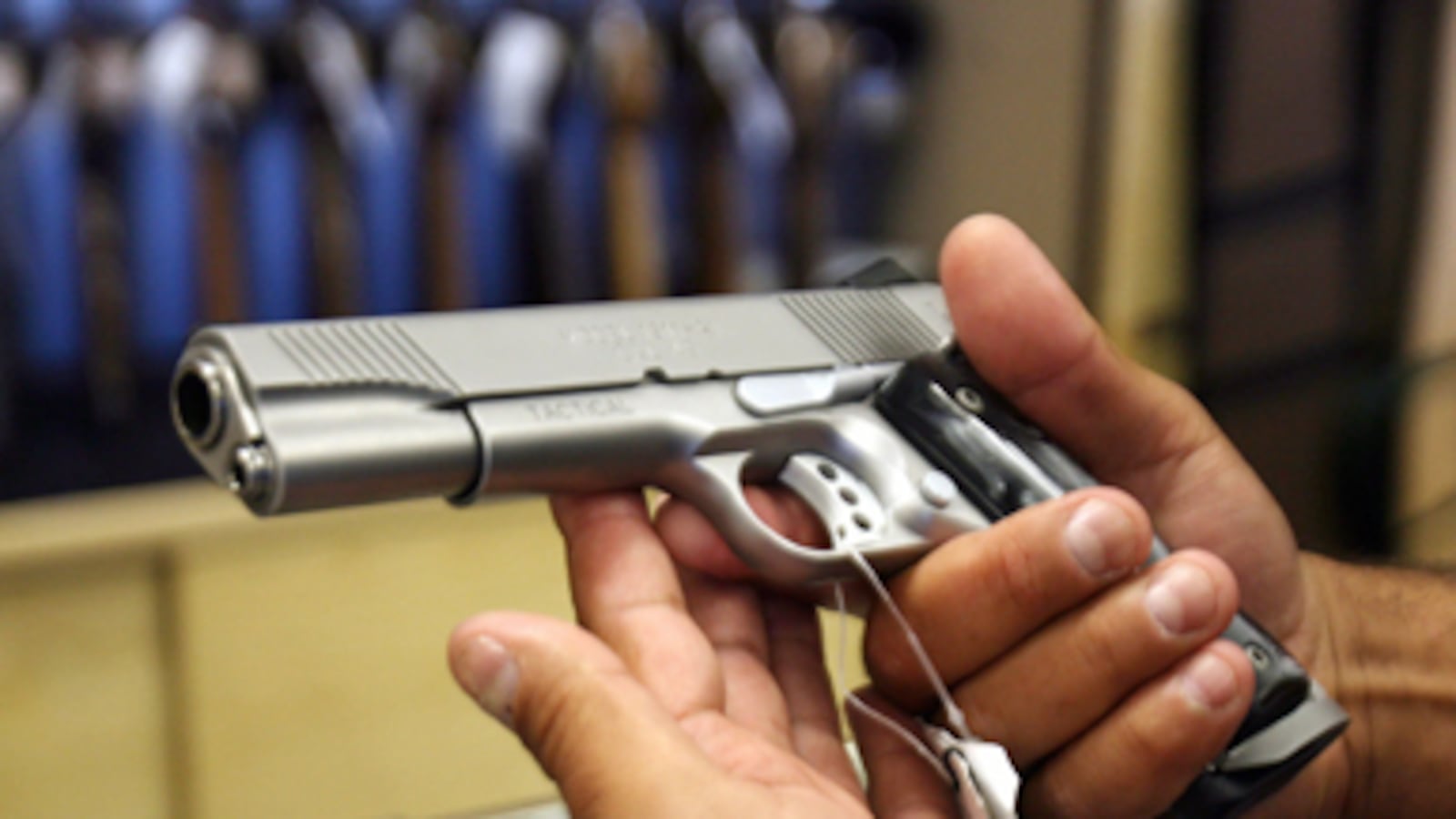As funerals of the victims of the Tucson massacre were underway nearby, it was business as usual at a Tucson gun shop, its walls covered with hunting trophies and "long guns," its glass cases packed with handguns; Glocks, Smith & Wessons, and Springfield Armory brands the most popular. Customers milled about and were greeted by friendly clerks, mostly avid hunters and firearms connoisseurs. Pundits and lawmakers may be talking about a gun culture gone mad. But in this store, the sellers see themselves as nothing more than guys trying to run a responsible and legal business in a tough economy—one based firmly on our constitutional rights. Passions are running hot. To those who desperately want to see stricter gun control, these clerks might be seen as aiding and abetting acts of violence. A store manager agreed to speak at length about his work and thoughts, but requested that his name and the name of his store be withheld.

The manager's short version: the Tucson massacre wasn't the fault of our national gun culture, or Arizona's gun culture. The right to bear arms, he says, will sometimes have consequences, but Americans have more rights and freedoms than people anywhere else. "Liberty has some painful aspects to it. Our founding fathers wanted us free and we want us free. We have many rights—it's as if we're presented with a dozen eggs, but one gets cracked now and again."
The manager, whose shop is respected by several retired law enforcement sources reached for this story, says what happened in Tucson "wasn't a gun issue, it was just an awful event, especially because it was Tucsonian on Tucsonian." (One-day sales of handguns in Arizona jumped 60 percent—263 guns—two days after the shooting, according to Federal Bureau of Investigation data. Ohio, Illinois, New York and California also saw big jumps. Nationally, one-day handgun sales rose 5 percent.)
"If someone comes in here and asks for fifteen Glocks we're not gonna sell them to him. There is a bit of common sense involved in all of this."
• John Avlon: Rise of the Fright Wing• Full coverage of the Arizona shootingA gun shop worker, the manager says, can't be held responsible for a lack of records on people who may have slipped through the cracks of the mental health care system. "I'm not a psychologist, or a sociologist, or a psychiatrist. It's not my place. I had some of our guys out building a gun safe yesterday at a house where the guy was wacky. When people get off their meds there's no way to keep them on them," he says. And if the person doesn't have an official record signaling him as a threat to himself or others due to mental health problems, there is little a gun shop worker can do. "When we used to regularly institutionalize people, society didn't have to deal with so many people with mental health problems, even if most can function well. But why are we debating this when no one is willing to go to the point of saying, 'You make me uncomfortable, I think I'll call the mind police.'" This shop sells guns every day to people from all walks of life, and every effort is made to keep guns out of the hands of criminals, he explains, following both the law and common sense. If a person wishes to buy a gun he or she must first fill out a 4473, the federal form required for anyone wishing to buy a firearm, and a one page ATF form (a second and third page is primarily filled out by the seller) that asks for basic biographical information. This includes whether the buyer is a citizen, a fugitive, has a criminal history, or has been mentally adjudicated or committed to a mental institution. Then the buyer's responses are verified through the National Instant Criminal Background Check System, NICS, mandated by the Brady Handgun Violence Prevention Act of 1993. The entire process from selection to purchase, if there are no denials, "is about half an hour." (Reporter Eve Conant accompanied a friend who purchased a handgun at Prescott, Arizona gun store this past summer; the process took twenty minutes.)
According to the FBI, more than 100 million such checks have been made in the last decade, leading to more than 700,000 denials. "But if a person libels on paper and gets denied that doesn't mean law enforcement will come after them," says the manager. "Because he can just say, 'Oh yeah, I forgot that part.' It's kind of a cat and mouse game." Beginning last summer, Gov. Jan Brewer signed into a law a bill that allowed U.S. citizens 21 and older to carry a concealed firearm without a permit in Arizona. It also eliminated the requirement for a concealed-carry weapons permit (as was the case for shooter Jared Loughner) but does require gun owners to accurately answer if an officer asks them if they are carrying a concealed weapon, and allows an officer to temporarily confiscate a weapon while they are talking to an individual, including during a traffic stop. If a person carries a weapon without a permit from Arizona or any other state they cannot carry it into places that serve alcohol for consumption on the premises. While it is illegal to purchase firearms for someone who wouldn't be able to buy one legally (called a "straw purchase"), "a gun can be purchased as a gift for someone who is not precluded from ownership of firearms." How does a gun shop owner know if that person really is okay? "You can't really know. A person can say he's buying a gun for his wife and you just can't know. It's very complicated. But we suggest they bring the wife in. We push for people to do stuff the right way. It's kind of a gray area." He adds that "any time a person purchases two handguns within five business days we call the ATF." What if a person wants to purchase, say, fifteen Glock handguns and passes a background check? "They have the legal ability, yes. But if someone comes in here and asks for fifteen Glocks we're not gonna sell them to him. There is a bit of common sense involved in all of this."
Supporters of gun control couldn't disagree more. According to the Brady Campaign to Prevent Gun Violence, Arizona has weak gun laws that help feed the illegal gun market and allow the sale of guns without background checks. In its 2009 state scorecards released for all 50 states, Arizona received a 2 out of a possible 100, based on several categories including curb firearm trafficking, strengthen Brady Background Checks, child safety, ban military-style assault weapons, and guns in public places and local control. As of 2009 Arizona had the second highest rate of crime gun sales (falling short of Louisiana) according to data from AFT reports crunched by the Brady Campaign.
Paul Helmke, President of the Brady Campaign, tells The Daily Beast that while shooter Jared Loughner may have purchased his gun legally, "Gun laws in this country are so weak that he didn't even break a law until he shot Giffords in the head." It can be up to the discretion of a responsible seller to turn away a buyer, even if, as manager says, "I don't care what business you're in, business is tough these days." He explains: "If I smell booze, or think, 'Hey, that guy's a freak,' I won't sell to him. If we don't feel good, we don't transact. It's just like signs that say 'no shoes, no shirt, no service.'We make judgments too."
Eve Conant is a Newsweek staff reporter covering immigration, politics, social and culture issues.







